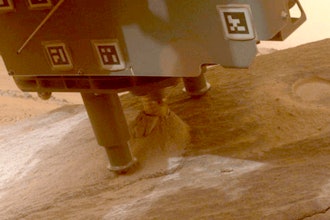Yesterday, researchers confirmed the presence of liquid water on Mars. Alfred McEwen, Principal Investigator, HiRISE, University of Arizona, explains that the water is present in thin layers of wet soil and is much saltier than Earth’s oceans.
The announcement has several implications, and also raises several questions, mainly: Is there life on Mars?
According to the researchers, this question is not abstract anymore, it’s a concrete one that can be answered – but nevertheless, not easily.
Luju Ojha, a Ph.D. candidate at Georgia Institute of Technology explains that the possibility of life on Mars has always been large. “Everywhere we go where there is liquid water, we find life,” adds Jim Green, director of planetary science at NASA Headquarters.
But, we still don’t know how life began on Earth, which makes it difficult to postulate how life may have begun on a different planet. “We don’t know if it’s possible for life to start on Mars,” explains Michael Meyer, lead scientist for the Mars Exploration Program at NASA Headquarters.
However, now that the researchers know what they are looking for, they can begin a better, more methodical search.
The next step will be looking for the water’s source and determining if there is an aquifer network. High resolution imaging will be key, as the Mars Rover is unable to access to steep terrain where the water is located.
While the rover won’t directly participate exploring these areas, in 2020 the new rover will sample the Martian atmosphere and extract oxygen – an in-situ resource utilization (ISRU) experiment with the objective to produce oxygen on Mars.
Researchers hope the confirmation of liquid water on Mars will help drive the ingenuity of engineers to come up with experiments that could go and explore these hard-to-reach areas.
With water and oxygen, the Red Planet will have the resources needed for future travelers. According to the researchers, humans will be sent to Mars in the near future as the resources are available to live on the surface.
But rest assured, “NASA isn’t Star Trek," says Green. “This isn’t ‘go where no man has gone before.'” The journey to Mars will be careful and calculated.
“We are on a journey to Mars and science is leading the way,” adds John Grunsfeld, astronaut and associate administrator of NASA’s Science Mission Directorate in Washington. “Science never sleeps.”






















